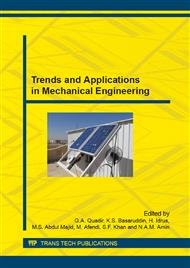p.345
p.349
p.354
p.361
p.367
p.372
p.378
p.383
p.388
PLC Trainer Kit Simulator: An Improvement for Automation Study in Polimas
Abstract:
Programmable logic controller (PLC) is a basic and essential element in the engineering of industrial automation. Therefore, basic knowledge of the early stages of PLC plays an important role, especially for mechatronics and manufacturing engineering students. However, due to limited equipment available, high cost equipment, high trainer student ratios, and low reliability of existing equipment, many educational institutions do cannot provide the sufficient resources necessary to help students to become proficient with PLC technology. To alleviate these main problems, the PLC Trainer Kit Simulator is to be developed and used in the Automation Lab at Polytechnic of Sultan Abdul Halim Mu’adzam Shah (POLIMAS). The PLC Trainer Kit Simulator will be used to help student on PLC applications for basic course in JF506 Manufacturing Engineering Laboratory. This study is a descriptive study with a quantitative approach. Evaluation will be determined based on pre-test and post-test. This paper reviews the necessity of the simulation kit prior to its implementation. It is expected that, the teaching and learning processes could become more effective thus contribute to positive impacts on students’ interest in learning PLC.
Info:
Periodical:
Pages:
367-371
DOI:
Citation:
Online since:
August 2015
Price:
Сopyright:
© 2015 Trans Tech Publications Ltd. All Rights Reserved
Share:
Citation:


